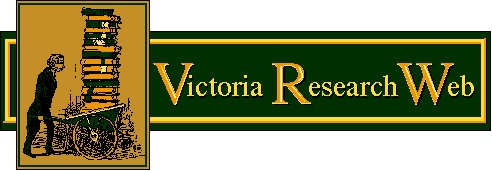The Web is emphatically NOT the best place to find the most substantial and reliable scholarly information about Victorian Britain or any other historical subject. No matter where you begin on even the very best websites, like George Landow's marvelous Victorian Web, all research roads lead straight back to the library, and it is there that you're most likely to find what you're looking for. Ten minutes spent looking up and reading the relevant entry in a thorough reference book like Sally Mitchell's Victorian Britain: An Encyclopedia will give you a much better start on almost any Victorian research project than any number of hours spent browsing the Web or dashing off e-mails to total strangers to ask for their help. (A number of these works of reference are listed in the "Libraries and Bibliographies" section of the VRW.) Reference and subject-area librarians can also be of enormous help in finding materials about your topic; this is, after all, their profession. I understand that not everyone lives near a good library, but that doesn't mean that websurfing can somehow substitute for one--it can't. If you're serious about exploring a topic, you'll have to make the effort to find and read scholarly books and articles that deal with it.
This is not to say that the Web can't be a useful tool for finding those materials, and primary sources as well. The whole point of the Victoria Research Web is to help researchers find the information they need, whether online or off, and other websites listed here have similar aims. The Web has some wonderful riches, some created by institutions and professionals, others gathered together and made available by volunteer enthusiasts. But it is not, and will not be for the foreseeable future, a compendium of all human knowledge or printed material, or anything even close to that. In the end it is just one powerful tool, and should never be the ultimate resort for a historical or literary query, let alone for an entire project or piece of written work. Doing "research" on the Web alone for a historical research paper is like copying entries out of an encyclopedia; it's not research at all, and it's certainly not college-level work.
For all its richness the Web is also full of incomplete and even completely mistaken and misleading information, including sloppy and unreliable electronic texts, tendentious sites with political or commercial aims to push, nostalgia sites whose "information" is mostly wishful thinking, and just plain slipshod research. Finding your way to reliable sources through all this dreck requires careful evaluation for pointers about how to do this. But a person just beginning to look for information on a topic rarely has enough background yet to make those kinds of judgments. The best preparation for using the Web and discussion lists as tools to enhance your research, therefore, is to begin that research at your local libraries, with the aid of a good librarian, who can usually order books for you from other libraries if necessary. You'll also find that the busy specialists who inhabit lists like VICTORIA, for instance, will be much more willing and able to help you if you've clearly done some homework beforehand. Cruising the Web for information is great fun, and often turns up some promising leads, useful summaries, and interesting sidelights if you use it sensibly, but by itself it doesn't even begin to substitute for old-fashioned research: hitting the books and sleuthing through the documents.

![[Contents]](1vrwhome.gif)
![[Top of Page]](1vrwtop.gif)